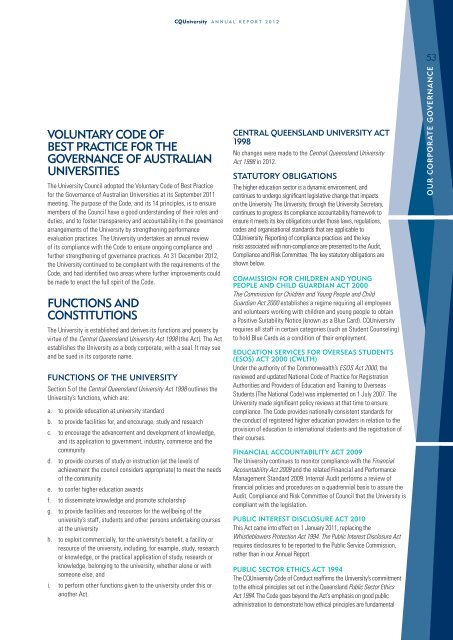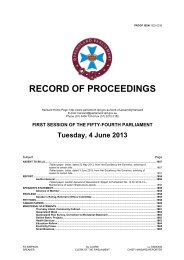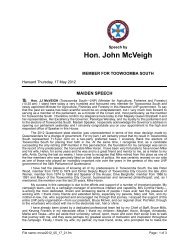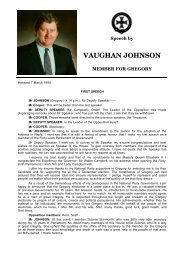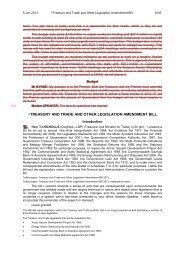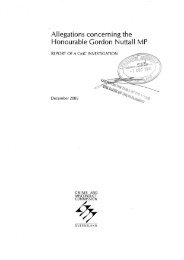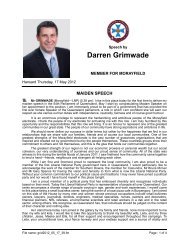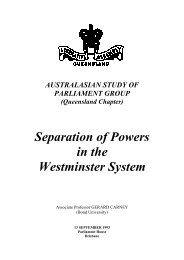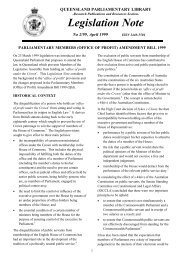CQUniversity Annual Report - Central Queensland University
CQUniversity Annual Report - Central Queensland University
CQUniversity Annual Report - Central Queensland University
You also want an ePaper? Increase the reach of your titles
YUMPU automatically turns print PDFs into web optimized ePapers that Google loves.
<strong>CQ<strong>University</strong></strong> ANNUAL REPORT 2012<br />
53<br />
VOLUNTARY CODE OF<br />
BEST PRACTICE FOR THE<br />
GOVERNANCE OF AUSTRALIAN<br />
UNIVERSITIES<br />
The <strong>University</strong> Council adopted the Voluntary Code of Best Practice<br />
for the Governance of Australian Universities at its September 2011<br />
meeting. The purpose of the Code, and its 14 principles, is to ensure<br />
members of the Council have a good understanding of their roles and<br />
duties, and to foster transparency and accountability in the governance<br />
arrangements of the <strong>University</strong> by strengthening performance<br />
evaluation practices. The <strong>University</strong> undertakes an annual review<br />
of its compliance with the Code to ensure ongoing compliance and<br />
further strengthening of governance practices. At 31 December 2012,<br />
the <strong>University</strong> continued to be compliant with the requirements of the<br />
Code, and had identifi ed two areas where further improvements could<br />
be made to enact the full spirit of the Code.<br />
FUNCTIONS AND<br />
CONSTITUTIONS<br />
The <strong>University</strong> is established and derives its functions and powers by<br />
virtue of the <strong>Central</strong> <strong>Queensland</strong> <strong>University</strong> Act 1998 (the Act). The Act<br />
establishes the <strong>University</strong> as a body corporate, with a seal. It may sue<br />
and be sued in its corporate name.<br />
FUNCTIONS OF THE UNIVERSITY<br />
Section 5 of the <strong>Central</strong> <strong>Queensland</strong> <strong>University</strong> Act 1998 outlines the<br />
<strong>University</strong>’s functions, which are:<br />
a. to provide education at university standard<br />
b. to provide facilities for, and encourage, study and research<br />
c. to encourage the advancement and development of knowledge,<br />
and its application to government, industry, commerce and the<br />
community<br />
d. to provide courses of study or instruction (at the levels of<br />
achievement the council considers appropriate) to meet the needs<br />
of the community<br />
e. to confer higher education awards<br />
f. to disseminate knowledge and promote scholarship<br />
g. to provide facilities and resources for the wellbeing of the<br />
university’s staff, students and other persons undertaking courses<br />
at the university<br />
h. to exploit commercially, for the university’s benefi t, a facility or<br />
resource of the university, including, for example, study, research<br />
or knowledge, or the practical application of study, research or<br />
knowledge, belonging to the university, whether alone or with<br />
someone else, and<br />
i. to perform other functions given to the university under this or<br />
another Act.<br />
CENTRAL QUEENSLAND UNIVERSITY ACT<br />
1998<br />
No changes were made to the <strong>Central</strong> <strong>Queensland</strong> <strong>University</strong><br />
Act 1998 in 2012.<br />
STATUTORY OBLIGATIONS<br />
The higher education sector is a dynamic environment, and<br />
continues to undergo significant legislative change that impacts<br />
on the <strong>University</strong>. The <strong>University</strong>, through the <strong>University</strong> Secretary,<br />
continues to progress its compliance accountability framework to<br />
ensure it meets its key obligations under those laws, regulations,<br />
codes and organisational standards that are applicable to<br />
<strong>CQ<strong>University</strong></strong>. <strong>Report</strong>ing of compliance practices and the key<br />
risks associated with non-compliance are presented to the Audit,<br />
Compliance and Risk Committee. The key statutory obligations are<br />
shown below.<br />
COMMISSION FOR CHILDREN AND YOUNG<br />
PEOPLE AND CHILD GUARDIAN ACT 2000<br />
The Commission for Children and Young People and Child<br />
Guardian Act 2000 establishes a regime requiring all employees<br />
and volunteers working with children and young people to obtain<br />
a Positive Suitability Notice (known as a Blue Card). <strong>CQ<strong>University</strong></strong><br />
requires all staff in certain categories (such as Student Counseling)<br />
to hold Blue Cards as a condition of their employment.<br />
EDUCATION SERVICES FOR OVERSEAS STUDENTS<br />
(ESOS) ACT 2000 (CWLTH)<br />
Under the authority of the Commonwealth’s ESOS Act 2000, the<br />
reviewed and updated National Code of Practice for Registration<br />
Authorities and Providers of Education and Training to Overseas<br />
Students (The National Code) was implemented on 1 July 2007. The<br />
<strong>University</strong> made significant policy reviews at that time to ensure<br />
compliance. The Code provides nationally consistent standards for<br />
the conduct of registered higher education providers in relation to the<br />
provision of education to international students and the registration of<br />
their courses.<br />
FINANCIAL ACCOUNTABILITY ACT 2009<br />
The <strong>University</strong> continues to monitor compliance with the Financial<br />
Accountability Act 2009 and the related Financial and Performance<br />
Management Standard 2009. Internal Audit performs a review of<br />
financial policies and procedures on a quadrennial basis to assure the<br />
Audit, Compliance and Risk Committee of Council that the <strong>University</strong> is<br />
compliant with the legislation.<br />
PUBLIC INTEREST DISCLOSURE ACT 2010<br />
This Act came into effect on 1 January 2011, replacing the<br />
Whistleblowers Protection Act 1994. The Public Interest Disclosure Act<br />
requires disclosures to be reported to the Public Service Commission,<br />
rather than in our <strong>Annual</strong> <strong>Report</strong>.<br />
PUBLIC SECTOR ETHICS ACT 1994<br />
The <strong>CQ<strong>University</strong></strong> Code of Conduct reaffirms the <strong>University</strong>’s commitment<br />
to the ethical principles set out in the <strong>Queensland</strong> Public Sector Ethics<br />
Act 1994. The Code goes beyond the Act’s emphasis on good public<br />
administration to demonstrate how ethical principles are fundamental<br />
OUR CORPORATE GOVERNANCE


